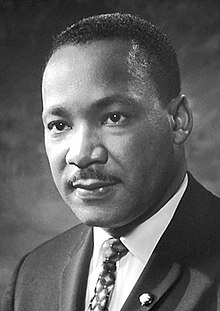
Word of the Day: Ken
Paul Schleifer
April 16 2018
Word of the Day: Ken
Ken means “one’s range of knowledge or understanding,” according to the OED. In the Scottish dialect, it can also mean just “know”: “I ken ye fer a roguish knave.” It comes from Old English cennan “to know,” from a PIE root *gno- “to know.” It is related to the word kenning, which is an expression in Old English and Norse poetry that is a kind of miniature metaphor, such as “whale road” for the sea or “sky candle” for the sun.
On this date in 1963, Martin Luther King, Jr., wrote his open letter defending the strategy of non-violent resistanceThe Birmingham campaign began on April 3 of that year, with marches and sit-ins protesting against the racial segregation that was prevalent in all of Alabama. It was organized by an Alabama Christian group and MLK, Jr.’s Southern Christian Leadership Conference (SCLC). A week later a judge ruled that the protests, including boycotts and picketing, were illegal, and two days later King and Ralph Abernathy and some others were arrested.
While in the jail, King was able to read “A Call for Unity,” a statement by 8 white Alabama clergymen against King and his methods of non-violent resistance. He started his response, he says in Why We Can’t Wait, on the margins of that newspaper because initially he was not allowed writing paper. Eventually, his lawyers got him paper, and he was able to complete the letter.
In the letter, King responded to the clergy’s claim that the fight should be fought in the courts and that King and his SCLC were outsiders, stirring up trouble in Birmingham. He defended the non-violent tactics. He warned that a rejection of his non-violent methods could lead blacks to “seek solace and security in black nationalist ideologies, a development that will lead inevitably to a frightening racial nightmare.” He also said, “Injustice anywhere is a threat to justice everywhere. We are caught in an inescapable network of mutuality, tied in a single garment of destiny. Whatever affects one directly, affects all indirectly.”
In this letter, King is writing in the tradition of the Founders: “A law is unjust if it is inflicted on a minority that, as a result of being denied the right to vote, nad no part in enacting or devising the law”: in other words, laws without representation are unjust. He says that people have an obligation to obey just laws, but he claims that they have both a legal and a moral responsibility to disobey unjust laws.
He criticized the Birmingham police for using “moral means to preserve immoral ends. Finally, he praised the demonstrators “for their sublime courage, their willingness to suffer and their amazing discipline in the midst of great provocation. One day the South will recognize its real heroes.”
Portions of the letter were published without consent, but finally in June Liberation published the entire open letter as “Letter from Birmingham Jail.” It has become highly anthologized and read in many college classes.
One thing that he wrote seems relevant to some recent events in our country: “In your statement you assert that our actions, even though peaceful, must be condemned because they precipitate violence. But is this a logical assertion? Isn’t this like condemning a robbed man because his possession of money precipitated the evil act of robbery? Isn’t this like condemning Socrates because his unwavering commitment to truth and his philosophical inquiries precipitated the act by the misguided populace in which they made him drink hemlock? Isn’t this like condemning Jesus because his unique God consciousness and never ceasing devotion to God’s will precipitated the evil act of crucifixion?”
This stated fear that a certain speaker or a certain activity will precipitate violence on a college campus has been the basis for stifling the free-speech rights of some. The threat of violence by some groups becomes the means for stifling the speech of others. And it’s wrong. The ones who should be punished are the ones who engage in violence no matter what their justification.
We should all remember what we learned when we were small: “Sticks and stones may break my bones, but words will never hurt me.” This I have kenned since I was small.
The image is of Martin Luther King, Jr.